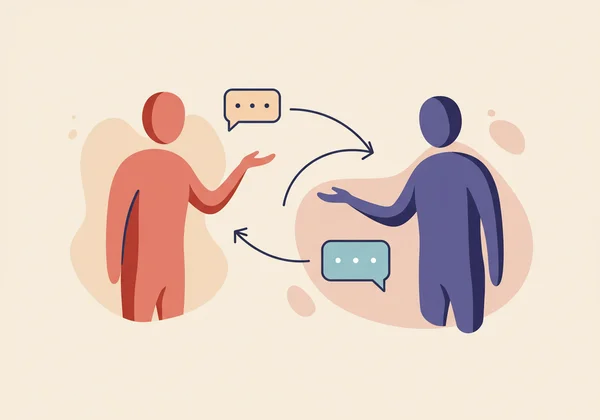Результаты онлайн-теста на синдром Аспергера: Ваше полное руководство по жизненным навыкам
October 30, 2025 | By Jasper Finch
Получение ценных сведений в результате теста на синдром Аспергера или распознавание его черт в себе — это поворотный момент. Это начало глубокого пути самопознания, который изменит вашу точку зрения с путаницы на ясность. Но после этого первоначального проблеска понимания возникает распространённый вопрос: каковы симптомы недиагностированного синдрома Аспергера у взрослых и что делать дальше? Это руководство — ваш инструментарий, призванный помочь вам перейти от самосознания к действиям, расширяющим ваши возможности, предоставляя практические стратегии для навигации в повседневной жизни и принятия своего уникального нейротипа.
Этот путь начинается с понимания. Ценные сведения, полученные от скринингового инструмента, могут стать первым шагом к построению жизни, которая соответствует вашему истинному «я». Если вы готовы начать, вы можете начать свой путь здесь. Это руководство проведёт вас через основополагающие навыки, которые помогут вам процветать.
Жизнь с синдромом Аспергера: Построение вашего фундамента
Прежде чем углубляться в конкретные жизненные навыки, важно заложить прочный фундамент понимания и принятия. Речь идёт не о «исправлении» чего-либо; речь идёт об обучении работе с уникальной структурой вашего мозга. Это новое понимание, часто инициируемое онлайн-тестом на синдром Аспергера, является краеугольным камнем личностного роста.
Понимание вашего уникального нейротипа
Синдром Аспергера теперь официально признан частью расстройства аутистического спектра (РАС), часто называемого РАС 1-го уровня. Это не болезнь или дефицит, а нейротип — иной способ обработки мира. Общие черты могут включать сильную сосредоточенность на определённых интересах, логический и аналитический подход к проблемам, а также уникальные паттерны в социальном общении.
Принятие нейроразнообразия означает сдвиг в повествовании от «расстройства» к «различию». Ваш мозг имеет отличительную операционную систему со своим набором сильных сторон. Признание этих сильных сторон, таких как невероятное внимание к деталям, лояльность и сильное чувство справедливости, является мощным актом подтверждения собственной ценности.
Сила самопознания и принятия
Путь после прохождения теста на синдром Аспергера для взрослых глубоко личен. Он включает в себя честную оценку своих сильных сторон и проблем без осуждения. Самопринятие — это решающий первый шаг к процветанию. Оно означает отказ от давления соответствовать нейротипичным стандартам и вместо этого создание среды, в которой вы можете быть самим собой.
Формирование позитивного самоописания является ключевым. Вместо того чтобы рассматривать социальные различия как неудачи, переосмыслите их как уникальные характеристики. Этот сдвиг даёт вам возможность использовать свои сильные стороны и разрабатывать бережные стратегии для областей, которые вы находите сложными. Понимание вашего профиля — это первый шаг, процесс, который может начаться с конфиденциального онлайн-скрининга.

Овладение исполнительными функциями и повседневными рутинами
Исполнительные функции — умственные навыки, которые включают планирование, организацию и управление временем — часто являются значительной проблемой для людей в спектре аутизма. Разработка эффективных стратегий в этой области может значительно снизить ежедневный стресс и создать чувство контроля и достижения.
Стратегии организации и планирования
Чувство перегруженности задачами — обычное явление. Ключ к успеху — разбить сложность на простые, управляемые части. Визуальные средства часто невероятно эффективны.
-
Визуальные расписания: Используйте календари, доски или приложения для составления расписания своего дня, недели или месяца. Видя свои обязательства, они могут казаться менее абстрактными.
-
Техника Помодоро: Работайте сфокусированными 25-минутными интервалами, разделёнными короткими перерывами. Это помогает поддерживать концентрацию и предотвращает выгорание при выполнении более длительных задач.
-
Декомпозиция задач: Разбейте крупные проекты (например, «убраться в доме») на более мелкие, конкретные шаги (например, «помыть посуду», «пропылесосить гостиную», «протереть столешницы»). Это делает начало задачи гораздо менее пугающим.

Создание устойчивых и успокаивающих рутин
Рутины обеспечивают структуру и предсказуемость, что может быть невероятно успокаивающим для аутичного ума. Они уменьшают умственную нагрузку, связанную с постоянным принятием решений, высвобождая когнитивную энергию для других вещей.
Хорошая рутина не является жёсткой, но гибкой. Цель состоит в том, чтобы создать предсказуемый ритм вашего дня. Например, утренняя рутина может включать пробуждение, несколько упражнений на растяжку, один и тот же завтрак и просмотр плана на день. Аналогично, вечерняя рутина может помочь вам расслабиться и подготовиться к спокойному сну. Также важно включить сенсорную регуляцию в свои рутины, например, запланировать тихое время или заняться успокаивающим занятием, таким как прослушивание музыки или использование утяжелённого одеяла. Обнаружение этих потребностей является частью понимания, которое вы можете получить от теста на синдром Аспергера для взрослых.
Навигация в социальных мирах: Общение и связь
Социальное взаимодействие часто описывается как один из самых сложных аспектов жизни с синдромом Аспергера. Однако, при наличии правильных стратегий, вы можете строить значимые связи, которые уважают ваш стиль общения и пределы социальной энергии.
Расшифровка социальных сигналов и бесед
Многие неписаные социальные правила могут казаться произвольными и запутанными. Вместо того чтобы пытаться угадать, сосредоточьтесь на разработке стратегий для ясности.
- Активное слушание: Внимательно слушайте, что говорят люди, и задавайте уточняющие вопросы, например: «Итак, вы имеете в виду...?» Это подтверждает ваше понимание и показывает вашу вовлечённость.
- Прямое общение: Примите свою естественную склонность к прямоте. Это нормально — чётко и вежливо излагать свои мысли и потребности. Это может предотвратить недопонимания, возникающие из-за попыток интерпретировать тонкие намёки.
- Изучение социальных сценариев: Для распространённых ситуаций, таких как светская беседа или интервью, наличие нескольких заранее подготовленных вопросов или тем может снизить тревожность.
Построение значимых отношений и дружбы
Значимые связи строятся на общих интересах и взаимном уважении, а не на освоении нейротипичного социального поведения.
Сосредоточьтесь на поиске своего круга. Присоединяйтесь к клубам, онлайн-группам или сообществам, сосредоточенным на ваших особых интересах. В этих средах ваша страсть и знания являются вашими преимуществами, что облегчает связь с единомышленниками. Также крайне важно управлять своей социальной батареей. Распознавайте признаки социального выгорания и сообщайте о своей потребности в уединении для перезарядки. Установление чётких границ не является эгоизмом; это важно для поддержания здоровых отношений. Для многих понимание этих социальных паттернов проясняется после прохождения бесплатного теста на синдром Аспергера.

Отстаивание своих интересов и благополучие: Ваш инструментарий поддержки
Процветание с синдромом Аспергера включает в себя создание поддерживающей экосистемы вокруг вас. Это означает научиться отстаивать свои потребности и уделять первостепенное внимание своему психическому и сенсорному благополучию. Этот путь к самозащите является глубоко личным, и всё начинается с самопознания, которое вы можете получить, пройдя тест на синдром Аспергера в рамках РАС.
Станьте своим лучшим защитником
Самозащита — это навык понимания и выражения своих потребностей другим. Речь идёт о том, чтобы обеспечить себе необходимые адаптации для успеха в различных средах, будь то на работе, в школе или в личных отношениях.
Это начинается с определения ваших потребностей. Вам нужны письменные инструкции вместо устных? Более тихое рабочее место для сосредоточения? Больше времени для обработки информации? Как только вы узнаете, что вам нужно, вы можете практиковать чёткое и уверенное сообщение об этом. Помните, что запрос на адаптацию — это уравнивание игрового поля, а не просьба о несправедливом преимуществе.
Приоритет психического здоровья и сенсорных потребностей
Жизнь в мире, не всегда приспособленном для вашего нейротипа, может быть стрессовой. Приоритет психического здоровья не подлежит обсуждению. Распознавайте ранние признаки выгорания, такие как повышенная раздражительность, истощение и отказ от занятий, которые вам обычно нравились.
Разработайте сенсорную «диету» — набор стратегий для управления сенсорным входом. Это может включать использование шумоподавляющих наушников в шумной обстановке, ношение солнцезащитных очков для уменьшения светочувствительности или выбор одежды из удобных тканей. Если вы испытываете трудности, обращение за профессиональной помощью к терапевту или коучу, имеющему опыт работы с нейроразнообразием, может предоставить неоценимую поддержку и стратегии. Этот путь к благополучию часто освещается первоначальными результатами онлайн-скрининга.

Ваш путь к полноценной жизни с синдромом Аспергера
Понимание ваших черт синдрома Аспергера — это не конечная точка; это начало более подлинной и полноценной жизни. Создавая основу самопринятия, осваивая практические жизненные навыки и учась отстаивать свои потребности, вы можете выйти за рамки простого приспособления и по-настоящему начать процветать. Каждая стратегия в этом руководстве — это инструмент, который вы можете адаптировать к своей уникальной жизни.
Этот путь самопознания продолжается и глубоко вознаграждается. Он требует терпения, самосострадания и готовности учиться. Первый и самый важный шаг — это получение чёткого понимания ваших личных черт и сильных сторон.
Готовы отправиться в путь самопознания? Пройдите тест на синдром Аспергера сегодня, чтобы получить более глубокие, основанные на ИИ сведения о вашем уникальном профиле и раскрыть свой потенциал.
Часто задаваемые вопросы о жизненных навыках и поддержке при синдроме Аспергера
Могут ли взрослые с синдромом Аспергера жить самостоятельно?
Безусловно. Многие взрослые с синдромом Аспергера живут полностью независимой и успешной жизнью. Независимость для каждого выглядит по-разному. Используя сильные стороны, такие как логика и сосредоточенность, а также внедряя персонализированные стратегии для организации, финансового планирования и повседневных рутин, независимая жизнь является вполне достижимой целью.
Какие положительные черты часто ассоциируются с синдромом Аспергера?
С нейротипом Аспергера связано множество сильных сторон. Они часто включают исключительную честность и преданность, глубокую способность сосредоточиться на областях интересов (что приводит к экспертным знаниям), сильное логическое и аналитическое мышление, а также уникальный, нестандартный подход к решению проблем. Многие люди также обладают сильным чувством справедливости и придерживаются своих принципов. Узнать об этих чертах можно, пройдя простой онлайн-тест.
Как отличить синдром Аспергера от социальной тревожности?
Хотя они могут сосуществовать, они различны. Социальная тревожность — это в первую очередь страх осуждения в социальных ситуациях. Синдром Аспергера включает фундаментальные различия в социальной обработке информации и общении. Человек с синдромом Аспергера может интуитивно не понимать определённые социальные сигналы, что приводит к тревоге, тогда как человек с социальной тревожностью может понимать сигналы, но бояться негативных реакций. Комплексная оценка, которая может начаться с анонимного онлайн-теста, помогает прояснить эти различия.
Где я могу найти надёжные группы поддержки для взрослых с синдромом Аспергера?
Надёжную поддержку можно найти через такие организации, как Сеть самозащиты аутистов (ASAN), местные общества аутизма и авторитетные онлайн-сообщества на платформах, таких как Reddit (например, r/aspergers) или специализированные форумы. Ищите группы, которые модерируются и продвигают позитивную, нейроразнообразную перспективу.
Есть ли эмпатия у людей с синдромом Аспергера?
Это распространённое заблуждение. Люди с синдромом Аспергера абсолютно обладают эмпатией, но они могут обрабатывать и выражать её по-другому. Они часто испытывают глубокую когнитивную эмпатию (логическое понимание точки зрения другого) и аффективную эмпатию (интенсивное переживание эмоций другого). Проблема часто заключается в демонстрации этой эмпатии нейротипично ожидаемыми способами, например, через выражение лица или конкретные вербальные ответы.